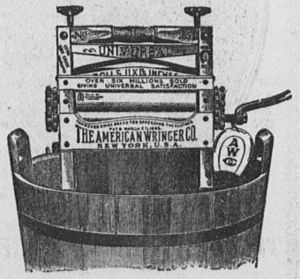Ellen Eglin facts for kids
Ellen F. Eglin was an amazing African-American inventor. She lived a long time ago, from before 1849 to after 1890. Ellen made doing laundry much easier for everyone. She invented a special machine called a clothes wringer. This invention was very important for both African Americans and women's history.
Quick facts for kids
Ellen F. Eglin
|
|
|---|---|
| Born | 1836 |
| Died | 1916 |
| Nationality | American |
| Occupation | Inventor, Housekeeper and Charwoman |
| Known for | Special type of clothes-wringer |
Early Life and Inspiration
Not much is known about Ellen Eglin's early life. This was common for many early Black women inventors. Ellen F. Eglin was born in Maryland in February 1836. Later, she and her family moved to Washington, D.C..
In Washington, D.C., Ellen worked as a housekeeper. She also worked as a government employee. Doing laundry was a very hard job back then. People scrubbed clothes by hand on a washboard. Then they had to squeeze out all the water. This difficult work made Ellen want to find a better way. This desire sparked her idea for a new invention.
The Clothes Wringer Invention
In 1888, Ellen Eglin invented her amazing device. It was a special kind of clothes-wringer. This machine had two wooden rollers. These rollers were attached to a crank. After clothes were washed, they were fed between these rollers. The wringer squeezed out a lot of water. This meant the clothes dried much faster.
Ellen's invention was very popular. It was used well into the 20th century. However, Ellen herself received almost no money or credit for it. At that time, it was hard for many inventors to keep the rights to their ideas. Ellen's race made it even harder for her.
A reporter asked Ellen why she sold her invention so cheaply. Ellen explained, "You know I am Black. If it was known that a negro woman patented the invention, white ladies would not buy the wringer." She was worried that racial bias would stop her invention from selling. So, she sold the design to a white agent for only $18. The buyer then made a lot of money from her invention. By 1900, a company called the American Wringer Company became rich from Ellen's design. Even today, wringers similar to hers are used for mops.
Later Plans
After selling her clothes-wringer, Ellen Eglin planned to create another invention. This time, she wanted to patent it in her own name. She hoped that "the invention will be known as a black woman's." She wanted to inspire other African American women.
Ellen planned to show her new invention at a special event. It was called the Women's International Industrial Inventors Congress. People of all races were invited there. Sadly, Ellen never attended this event. Her mystery invention was never officially recorded. It is thought that she later worked as a clerk in a census office.
Final Years
Not much is known about Ellen Eglin's later life. We do not know exactly when or where she died. Ellen Eglin seems to have spent her last years in Washington, D.C. In 1890, she worked for the United States Department of the Interior. She was a charwoman in the Census Office.
She lived at 1929 11th Street, N. W., with her brother Charles. Charles was a Union Navy veteran and a teamster. He died in July 1896. He left his property to his three siblings, including Ellen. Ellen Eglin last appeared in the Washington city directories in 1916.
See also
 In Spanish: Ellen Eglin para niños
In Spanish: Ellen Eglin para niños
 | Charles R. Drew |
 | Benjamin Banneker |
 | Jane C. Wright |
 | Roger Arliner Young |


